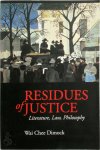Wai Chee Dimock - Residues of Justice
| Schrijver: | Wai Chee Dimock |
|---|---|
| Titel: | Residues of Justice |
| ISBN: | 9780520202443 |
| Uitgever: | University of California Press |
| Bijzonderheden: | Goed, 1997, Paperback, 278p |
| Prijs: | € 17,50 |
| Verzendkosten: | € 4,50 (binnen Nederland) |
| Meer info: |
In this arresting book, Wai Chee Dimock takes on the philosophical tradition from Kant to Rawls, challenging its conception of justice as foundational, self-evident, and all-encompassing. The idea of justice is based on the premise that the world can be resolved into commensurate terms: punishment equal to the crime, redress equal to the injury, benefit equal to the desert. Dimock focuses, however, on what remains unexhausted, unrecovered, and noncorresponding in the exercise of justice. To honor these \"residues,\" she turns to literature, which, in its linguistic density, transposes the clean abstractions of law and philosophy into persistent shadows, the abiding presence of the incommensurate. Justice can only be a partial answer to the phenomenon of human conflict.In arguing for justice as an incomplete virtue, Dimock draws upon legal history, political philosophy, linguistics, theology, and feminist theory; she discusses Aristotle and Augustine, Locke and Luther, Marx and Durkheim, Michael Sandel and Carol Gilligan, Noam Chomsky and Mary Ann Glendon. She also examines an unusual configuration of nineteenth-century American authors, pairing figures such as Herman Melville and Rebecca Harding Davis, Walt Whitman and Susan Warner.The result is a book both passionate and scholarly. It invites us to rethink the meanings of literature, law, and philosophy, and to imagine a language of community more supple and more nuanced than the language of justice. In this arresting book, Wai Chee Dimock takes on the philosophical tradition from Kant to Rawls, challenging its conception of justice as foundational, self-evident, and all-encompassing. The idea of justice is based on the premise that the world can be resolved into commensurate terms: punishment equal to the crime, redress equal to the injury, benefit equal to the desert. Dimock focuses, however, on what remains unexhausted, unrecovered, and noncorresponding in the exercise of justice. To honor these \"residues,\" she turns to literature, which, in its linguistic density, transposes the clean abstractions of law and philosophy into persistent shadows, the abiding presence of the incommensurate. Justice can only be a partial answer to the phenomenon of human conflict.In arguing for justice as an incomplete virtue, Dimock draws upon legal history, political philosophy, linguistics, theology, and feminist theory; she discusses Aristotle and Augustine, Locke and Luther, Marx and Durkheim, Michael Sandel and Carol Gilligan, Noam Chomsky and Mary Ann Glendon. She also examines an unusual configuration of nineteenth-century American authors, pairing figures such as Herman Melville and Rebecca Harding Davis, Walt Whitman and Susan Warner.The result is a book both passionate and scholarly. It invites us to rethink the meanings of literature, law, and philosophy, and to imagine a language of community more supple and more nuanced than the language of justice.
|

De verkoper zal binnen 3 werkdagen contact met u opnemen om de koop verder af te handelen.

